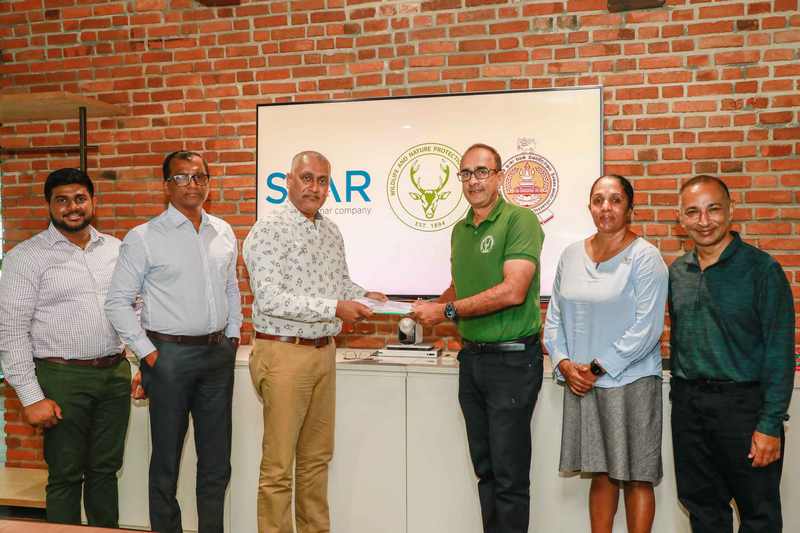
Star to power Sri Lanka’s Blue Carbon Stock Restoration
Star Garments Group, a leading global apparel manufacturer headquartered in Sri Lanka extended its support to the country’s Blue Carbon stock restoration. Via the signing of an MOU with the Wildlife and Nature Protection Society, Star to naturally regenerate mangroves across 3 hectares of land, located at Anawilundawa Ramsar wetland on March 1, 2023, in commemoration of ‘World Seagrass Day’.
During the Commonwealth Heads of Government meeting held in London in 2018, the importance of preserving our nation’s mangroves became apparent, especially at a time when Sri Lanka is ranked as No. 2 in the Global Climate Risk Index. With Sri Lanka’s affirmed commitment to champion the Mangrove Ecosystems and Livelihoods Action Group (MELAG) of the Commonwealth Blue Charter.
Referred to as “Blue forests” coastal and marine ecosystems consisting of mangrove forests, seagrass meadows and tidal salt marshes are some of the most efficient carbon sequestration tools found in nature. They can store up to ten times more CO2 per unit area than tropical rainforests, making them a powerful weapon against global warming and climate. The United Nations General Assembly adopted a Sri Lanka-sponsored resolution to declare March 1st (as of 2023) as ‘World Seagrass Day’
In partnership with the Wildlife and Nature Protection Society, the Department of Wildlife Conservation, and the University of Wayamba, Star’s collaboration was a seamless match as the company is the largest in Sri Lanka to have achieved Carbon Neutral status and the only apparel manufacturer with a complete group of factories to have done so. The natural mangroves regeneration project at Anawilundawa Ramsar wetland marks Star Garments Group‘s first step in its journey towards biodiversity restoration of at least 50% of its physical footprint.
Speaking on the initiative Jeevith Senaratne, Director of Operations Star Garments Group stated: “When we looked into the Star Garments Group factories/ Offices, we figured out that the land acquired to build would have been a vegetation area at some stage. Star currently operates on approximately 40 acres of land In Sri Lanka. Thus, operating with the intention of restoring the biodiversity loss due to our operations, we are looking at partnering on impactful biodiversity restoration projects.”
Deforestation continues in Sri Lanka at a rate of 8,000 hectares of forest area per year and by 2030 there will be only 10% of the world’s rainforests left. Sri Lanka’s current mangrove cover, estimated to be 15,000-19,000 Hectares, is a mere 0.3% of the total landmass and is critically low. Mangroves are an integral part of our forests and constitute about 2% of Sri Lanka’s total forest cover. Sri Lanka is fast losing mangroves, due to multiple, interconnected threats like the construction of shrimp farms, salterns, indiscriminate cutting, inorganic ions from agriculture, organic compounds from untreated sewage disposal, illegal constructions, urbanization and tourism.
Concluding, Senaratne noted: “Most importantly mangroves can fight climate change. Due to their ability to absorb carbon, mangrove forests are known as ‘carbon sinks’ or ‘carbon-rich biomes’. By storing excess carbon, they help reduce global warming as there is less carbon dioxide trapped in the atmosphere, and is globally highlighted as a prime need for conserving mangroves. These natural ecosystems also play a key role in the country’s coastal protection and provides protection from storm surges and catastrophic events like floods & tsunamis. Not only this, but mangrove ecosystems also provide sustainable livelihoods for many rural communities.”
In line with the purpose of its mother company Komar; “One Reputation, Real Values”, Star Strives to be an Icon of sustainability. Star Garments Group has been benchmarked against several global platforms, and its Innovation Center, located in Katunayake, Sri Lanka is the first passive house building in Southeast Asia and leverages a rigorous set of design principles focused on energy efficiency. As Sri Lanka’s largest carbon-neutral entity and the only apparel manufacturer to have all its facilities certified as carbon-neutral, Star also plays host to 7 LEED certified facilities of which 2 are certified as LEED platinum, 3 as LEED Gold, and 2 as LEED Silver, continuously performing in accordance with the Higg Facility Environmental Module (FEM) of Sustainable Apparel Coalition (SAC) since 2017, achieving drastic improvements, which is evident from its 75%+ score in 2021.



